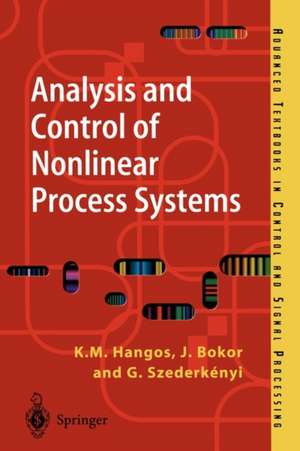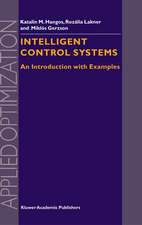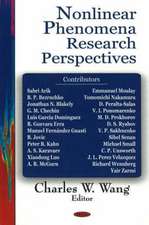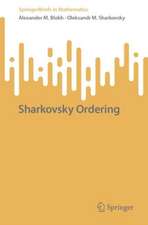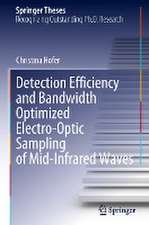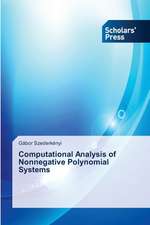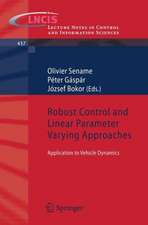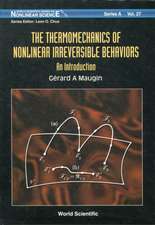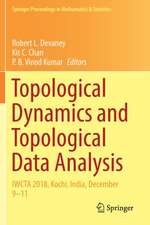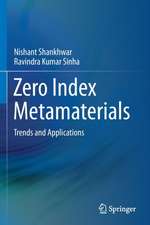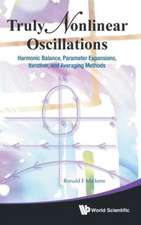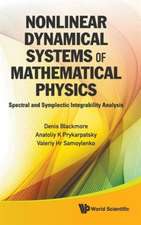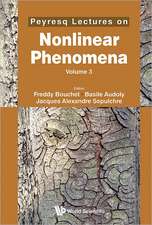Analysis and Control of Nonlinear Process Systems: Advanced Textbooks in Control and Signal Processing
Autor Katalin M. Hangos, József Bokor, Gábor Szederkényien Limba Engleză Paperback – 6 apr 2004
Features:
• Mathematical preliminaries for readers from a process engineering background.
• Constant reference to the finite-dimensional linear time-invariant continuous case as a basis for extension to the nonlinear situation.
• Theories and analytical methods laid out clearly and straightforwardly with exercises to reaffirm the techniques as they are taught.
• Emphasis on process knowledge and first-principles-based models in obtaining feasible and effective solutions in particular circumstances from general cases.
• Simple examples and case studies.
Din seria Advanced Textbooks in Control and Signal Processing
- 17%
 Preț: 460.72 lei
Preț: 460.72 lei - 15%
 Preț: 659.35 lei
Preț: 659.35 lei -
 Preț: 375.68 lei
Preț: 375.68 lei - 15%
 Preț: 593.42 lei
Preț: 593.42 lei - 15%
 Preț: 616.31 lei
Preț: 616.31 lei - 18%
 Preț: 991.55 lei
Preț: 991.55 lei - 20%
 Preț: 572.72 lei
Preț: 572.72 lei - 15%
 Preț: 502.22 lei
Preț: 502.22 lei -
 Preț: 393.90 lei
Preț: 393.90 lei - 15%
 Preț: 499.26 lei
Preț: 499.26 lei -
 Preț: 394.29 lei
Preț: 394.29 lei - 15%
 Preț: 582.30 lei
Preț: 582.30 lei -
 Preț: 358.79 lei
Preț: 358.79 lei - 15%
 Preț: 652.49 lei
Preț: 652.49 lei -
 Preț: 396.02 lei
Preț: 396.02 lei -
 Preț: 396.40 lei
Preț: 396.40 lei - 15%
 Preț: 505.83 lei
Preț: 505.83 lei - 19%
 Preț: 564.48 lei
Preț: 564.48 lei - 20%
 Preț: 333.72 lei
Preț: 333.72 lei -
 Preț: 402.00 lei
Preț: 402.00 lei - 15%
 Preț: 502.22 lei
Preț: 502.22 lei - 15%
 Preț: 658.05 lei
Preț: 658.05 lei - 15%
 Preț: 592.95 lei
Preț: 592.95 lei -
 Preț: 392.75 lei
Preț: 392.75 lei - 23%
 Preț: 669.20 lei
Preț: 669.20 lei - 19%
 Preț: 475.27 lei
Preț: 475.27 lei - 19%
 Preț: 531.49 lei
Preț: 531.49 lei - 19%
 Preț: 535.15 lei
Preț: 535.15 lei - 15%
 Preț: 711.40 lei
Preț: 711.40 lei - 15%
 Preț: 474.82 lei
Preț: 474.82 lei -
 Preț: 391.99 lei
Preț: 391.99 lei - 15%
 Preț: 532.05 lei
Preț: 532.05 lei - 15%
 Preț: 506.48 lei
Preț: 506.48 lei - 15%
 Preț: 597.01 lei
Preț: 597.01 lei - 21%
 Preț: 467.48 lei
Preț: 467.48 lei
Preț: 390.46 lei
Nou
Puncte Express: 586
Preț estimativ în valută:
74.71€ • 78.01$ • 61.70£
74.71€ • 78.01$ • 61.70£
Carte tipărită la comandă
Livrare economică 15-29 aprilie
Preluare comenzi: 021 569.72.76
Specificații
ISBN-13: 9781852336004
ISBN-10: 1852336005
Pagini: 310
Ilustrații: XXVI, 310 p.
Dimensiuni: 155 x 235 x 16 mm
Greutate: 0.47 kg
Ediția:2004
Editura: SPRINGER LONDON
Colecția Springer
Seria Advanced Textbooks in Control and Signal Processing
Locul publicării:London, United Kingdom
ISBN-10: 1852336005
Pagini: 310
Ilustrații: XXVI, 310 p.
Dimensiuni: 155 x 235 x 16 mm
Greutate: 0.47 kg
Ediția:2004
Editura: SPRINGER LONDON
Colecția Springer
Seria Advanced Textbooks in Control and Signal Processing
Locul publicării:London, United Kingdom
Public țintă
ResearchCuprins
Basic Notions of Systems and Signals.- State-space Models.- Dynamic Process Models.- Input-output Models and Realization Theory.- Controllability and Observability.- Stability and The Lyapunov Method.- Passivity and the Hamiltonian View.- State Feedback Controllers.- Feedback and Input-output Linearization of Nonlinear Systems.- Passivation by Feedback.- Stabilization and Loop-shaping.
Recenzii
From the reviews:
...I believe this book represents a welcome addition to textbooks on nonlinear systems and control theory and well deserves to be a recommended textbook on the reading list of any nonlinear systems and control course aimed at graduate and postgraduate students in Process Engineering.
Automatica 42 (2006) 1829 – 1831 (Reviewer: Mario di Bernado)
...I believe this book represents a welcome addition to textbooks on nonlinear systems and control theory and well deserves to be a recommended textbook on the reading list of any nonlinear systems and control course aimed at graduate and postgraduate students in Process Engineering.
Automatica 42 (2006) 1829 – 1831 (Reviewer: Mario di Bernado)
Notă biografică
Katalin Hangos obtained M.Sc.s in chemistry and computer science form Loránd Eötvös University in Budapest, and a Ph.D. and D.Sc from the Hungarian Academy of Science. She is currently a professor at the Hungarian Academy as well as a visiting professor at the University of Queensland and at the Technical University of Denmark. Her current research interests include: intelligent control systems and the theoretical foundations of model-based operator support systems. She teaches at both undergraduate and postgraduate level in intelligent control and the analysis and control of non-linear systems.
József Bokor is the Research Director of the Systems and Control Laboratory at the Hungarian Academy of Sciences. He obtained his M.Sc. from the Technical University of Budapest and his Ph.D. and D.Sc. from the Hungarian Academy. His research interests include Identification problems in closed-loop systems, fault detection and modelling of dynamic systems with associated realisation theories. He teaches postgraduate courses in multi-variable feedback systems, system identification and control of non-linear systems.
Gábor Szederkényi has just obtained his Ph.D. from the University of Veszprém but has already published papers in a number of peer-reviewed journals and is now a research fellow at the Hungarian Academy. His research interests include: analysis and control of non-linear systems and model-based fault detection and diagnosis in non-linear systems. He currently teaches undergraduates in linear control theory and discrete mathematics.
József Bokor is the Research Director of the Systems and Control Laboratory at the Hungarian Academy of Sciences. He obtained his M.Sc. from the Technical University of Budapest and his Ph.D. and D.Sc. from the Hungarian Academy. His research interests include Identification problems in closed-loop systems, fault detection and modelling of dynamic systems with associated realisation theories. He teaches postgraduate courses in multi-variable feedback systems, system identification and control of non-linear systems.
Gábor Szederkényi has just obtained his Ph.D. from the University of Veszprém but has already published papers in a number of peer-reviewed journals and is now a research fellow at the Hungarian Academy. His research interests include: analysis and control of non-linear systems and model-based fault detection and diagnosis in non-linear systems. He currently teaches undergraduates in linear control theory and discrete mathematics.
Textul de pe ultima copertă
Almost all process systems are nonlinear in nature. Nonlinear control is traditionally an area of interest in process systems engineering which is of great practical importance. These facts notwithstanding, many process engineers have difficulty with the paradigms and results of modern nonlinear control theory because they lack the mathematical background usually associated with such methods or because of their computational difficulty and small-scale applicability in the general case. Analysis and Control of Nonlinear Process Systems overcomes these barriers.
Features:
• The necessary mathematical preliminaries for readers from a process engineering background.
• Constant reference to the widely-known finite-dimensional linear time-invariant continuous case as a basis for extension to the nonlinear situation.
• The most promising theories and analytical methods for nonlinear process control laid out clearly and straightforwardly with exercises to reaffirm the techniques as they are taught.
• Emphasis on the importance of process knowledge and first-principles-based models in obtaining feasible and effective solutions in particular circumstances from general cases.
• Illustration of applications with simple examples and case studies.
Analysis and Control of Nonlinear Process Systems will interest graduate process engineers wishing to study advanced control methods either with a view to further research or application in industry as well as to academics seeking to move process control courses into more complicated but up-to-date territory. It will also be a great assistance to those in their senior undergraduate years who will form the next generation of industrial process engineers and need unfussy access to the most modern nonlinear control ideas.
Features:
• The necessary mathematical preliminaries for readers from a process engineering background.
• Constant reference to the widely-known finite-dimensional linear time-invariant continuous case as a basis for extension to the nonlinear situation.
• The most promising theories and analytical methods for nonlinear process control laid out clearly and straightforwardly with exercises to reaffirm the techniques as they are taught.
• Emphasis on the importance of process knowledge and first-principles-based models in obtaining feasible and effective solutions in particular circumstances from general cases.
• Illustration of applications with simple examples and case studies.
Analysis and Control of Nonlinear Process Systems will interest graduate process engineers wishing to study advanced control methods either with a view to further research or application in industry as well as to academics seeking to move process control courses into more complicated but up-to-date territory. It will also be a great assistance to those in their senior undergraduate years who will form the next generation of industrial process engineers and need unfussy access to the most modern nonlinear control ideas.
Caracteristici
Gives the student an idea of what is really going to work by stressing the importance of process knowledge and models developed from first principles Provides the process control student with the necessary mathematical basics to tackle nonlinear control while also tackling advanced subjects such as feedback linearisation Includes supplementary material: sn.pub/extras
